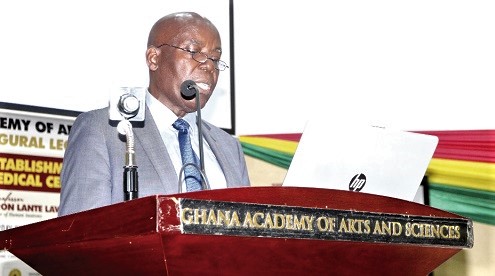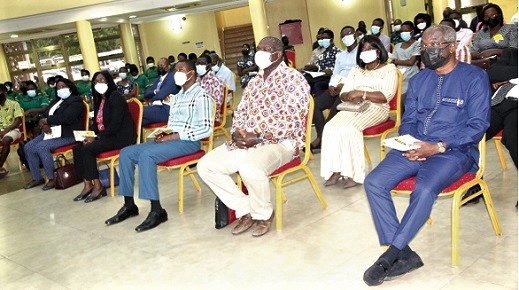
Establish academic centres in all medical training institutions : It’ll deepen medical training
A Professor of Anatomy at the University of Ghana Medical School (UGMS), Professor Aaron Lante Lawson, has called for the establishment of academic medical centres (AMCs) in all medical training institutions to help deepen medical training, research and service delivery in the country.
He indicated that AMCs were assets that provided an environment for evolution in medical education, research and service delivery.
He indicated that the alignment of health care, education and research would ensure the translation of research outcomes into clinical care for the benefit of the country.
Prof. Lawson said this when he delivered an inaugural lecture at the Ghana Academy of Arts and Sciences (GAAS) in Accra last Thursday.
The lecture was on the topic: “Establishment of Academic Medical Centres in Ghana”, and the purpose was to consider the historical development of AMCs globally, the attempt by Ghana to create an itinerary for AMCs and the challenges encountered.
AMCs
AMCs are medical schools within university set-ups and health facilities which may or may not be owned by the university.
The centres have a three-fold mission — the provision of education and training, the conduct of research and the delivery of patient care.
Also known as academic health science centres or academic health science partnerships, AMCs are intended to ensure that medical research breakthroughs lead to direct clinical benefits for patients.
Challenges
Prof. Lawson, who is also a Fellow of the GAAS, said it was obvious from the historical account that the country had been trying to set up and run AMCs but had not succeeded.
He said one of the factors accounting for that was the presence of a cultural difference between academia and health, noting that while universities with health training institutions were largely focused on their academic mission of education and research, hospitals focused on their clinical mission, namely, excellence in health service delivery.
Therefore, Prof. Lawson said, brining the two cultures together to make them understand and complement each other had been an arduous task.
Additionally, he said, major differences existed in the administrative and governance structures.
He noted that the universities operated under their respective laws setting them up and were guided by statutes, while the teaching hospitals operated under the Ghana Health Service and the Teaching Hospitals Act (Act 525) and their amended versions.

Furthermore, he said, there was little recognition of the AMC concept and, therefore, the lack of appreciation of core collective responsibility towards training, research and patient care by both health training institutions and teaching hospitals.
He also said there were large salary disparities between faculties in the universities and their counterparts in the teaching hospitals, leading to the perennial reluctance of well-qualified personnel to join the universities.
“So several factors have accounted for why the AMC concept has not been fully embraced and operationalised with success in our country,” Prof. Lawson said.
The way forward
He indicated that Ghana was blessed to have in place the basic ingredients that made up AMCs and other health institutions in university settings.
That, he said. satisfied the three-pronged mission of AMCs.
Lacking, however, was the need to understand the concept and the will to operationalise it, Prof. Lawson said.
While making reference to the Ghana Health Service and the Teaching Hospitals (Amendment) Act 2019 (Act 1009), he said it required university councils to nominate two representatives with considerable experience in health, education and research to be on the boards of the teaching hospitals.
